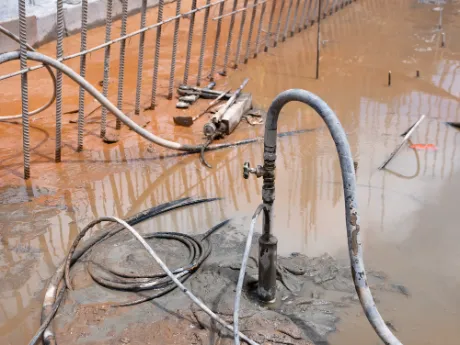What is Ground Improvement?
What is ground improvement? Good question. In construction, ensuring that the ground beneath your project is stable and capable of supporting the structure is critical to long-term project success. This blog will guide you through the fundamentals of ground improvement, including the various methods used to strengthen and stabilize soil, such as permeation grouting, compaction grouting, and poly foam chemical grouting. You’ll also learn why ground improvement is especially important for projects in regions like Long Island, Brooklyn, and Queens, where challenging soil conditions often demand specialized solutions.
Contact Piers and Piles for Expert Ground Improvement Solutions in Long Island, Brooklyn, and Queens
What is Ground Improvement?
Ground improvement refers to the process of enhancing the strength and stability of soil to support structures, prevent settlement, and mitigate risks such as erosion or water infiltration. In construction, particularly in areas with poor or unstable soil, ground improvement is essential to ensure that foundations and structures are built on a solid, durable base. This process is especially critical in regions like Long Island, Brooklyn, and Queens, where soil conditions can be challenging due to the mix of coastal environments, high groundwater levels, and urban development.
At Piers and Piles, we specialize in several ground improvement techniques tailored to the unique soil conditions of these areas, ensuring long-term stability and safety for both residential and commercial projects.

Benefits of Ground Improvement
Ground improvement is a crucial step in ensuring that construction projects are built on a stable foundation. By improving the strength and stability of the soil, these techniques provide several key advantages for both residential and commercial construction.
Below are the primary benefits of ground improvement:
- Prevents Foundation Settlement
- Increases Load-Bearing Capacity
- Mitigates Erosion and Water Infiltration
- Reduces Long-Term Maintenance Costs
- Enhances Site Stability
- Minimizes Construction Delays
By choosing the right ground improvement method, you can safeguard your structure from future issues and ensure its long-term stability and performance.
Permeation Grouting
Permeation grouting is a ground improvement method where grout is injected into the soil to fill voids and increase strength without displacing the existing soil. This technique involves the permeation of a low-viscosity grout into loose or weak soil, which hardens to form a more solid, stable mass.
Commonly used in foundations and retaining walls, permeation grouting is particularly effective in soft or loose soils, helping to enhance the ground’s load-bearing capacity and reduce settlement.
Compaction Grouting
Compaction grouting is a technique designed to densify weak soils by injecting a thick grout mixture into the ground, which compresses and displaces the surrounding soil. This creates a stronger, more compact base capable of supporting heavier loads.
The benefits of compaction grouting include the prevention of settling and improved load-bearing capacity, making it ideal for both residential and commercial construction projects where soil conditions are less than optimal.
Poly Foam Chemical Grouting
Poly foam chemical grouting is a process that uses expanding polyurethane foam to stabilize soil, fill voids, and lift foundations. The foam expands upon injection, providing quick stabilization and effective void filling without the need for excavation or soil displacement.
This method is ideal for precise, non-invasive solutions, especially in tight spaces or water-sensitive areas, where minimal disruption to the site is critical.
Why Ground Improvement is Important for Long-Term Stability
Ground improvement is vital for ensuring that construction projects are built on stable, durable soil. Without proper ground preparation, foundations can shift, settle, or fail over time, leading to costly repairs and unsafe structures. Techniques like permeation grouting, compaction grouting, and poly foam chemical grouting help prepare sites by strengthening weak soils, filling voids, and preventing erosion, ultimately protecting the integrity of the entire structure. These methods are particularly valuable in areas like Long Island, Brooklyn, and Queens, where soil conditions often pose challenges. By reinforcing the ground, these services ensure long-term foundation stability for both residential and commercial buildings.
Contact Piers and Piles Today to Find the Best Ground Improvement Solution for Your Project
Choosing the right ground improvement method is crucial to the success of any construction project. By enhancing the strength and stability of your site’s soil, you can protect your investment and ensure the longevity of your structure. Contact Piers and Piles today for a consultation to determine the best ground improvement solution for your specific project needs in Long Island, Brooklyn, or Queens.
Schedule Your Ground Improvement Consultation with Piers and Piles Today